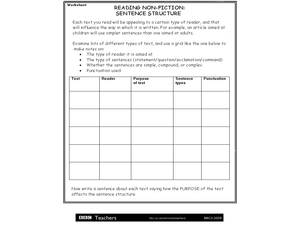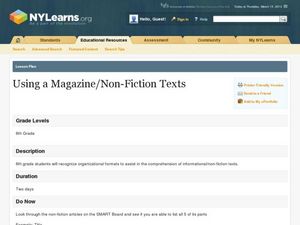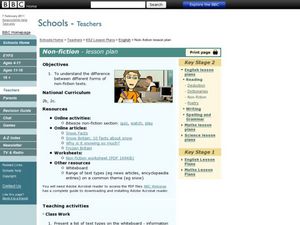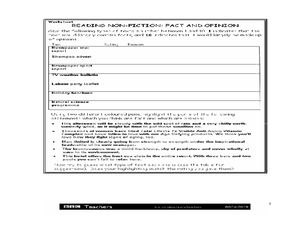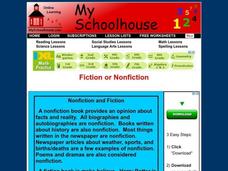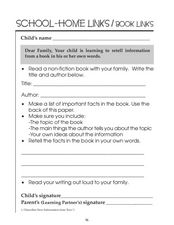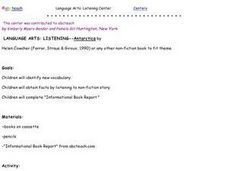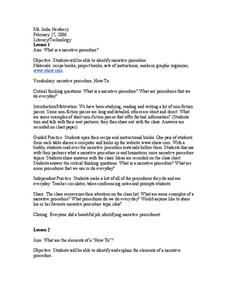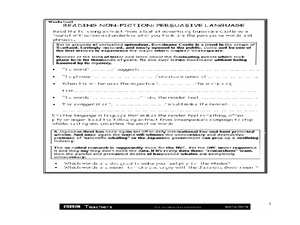Great Schools
A Questionnaire: What Do You Like to Read?
What do your fifth graders know about types of fiction, nonfiction, and poetry? Find out as they fill out this questionnaire that requires them to list authors and texts that exemplify each genre. Not only will you be able to assess what...
Curated OER
Reading Non-Fiction: Sentence Structure
Use this worksheet to help make explicit the connection between sentence structure, audience, and author's purpose. Readers track and find patterns in sentence structure in various nonfiction texts, and connect it to the purpose of the...
Curated OER
The Mythology of Munich
Students listen to a story read by their teacher and identify the pictures inside it to be real or make believe. For this fiction and non fiction lesson plan, students also write a real or make believe story of their own.
Curated OER
Using a Magazine/Non-Fiction Texts
Working with magazine articles and other informational texts, students identify the parts of a non-fiction work. The learners use SMART board files to guide instruction, as well as a transition to writing their own non-fiction article in...
Curated OER
Lesson 1:Using Headings to Determine the Main Idea (nonfiction)
Sometimes all you need is a good heading to determine the main idea in a block of text. Young readers learn how to use headings to guild them to determining the main idea. They practice as a class, in pairs, and then on their own. The...
Curated OER
Distinguishing Fiction and Non Fiction
Have your class go on picture walks of different books, and identify them as either fiction or non fiction and why. Working in groups, kindergartners state whether the book tells information or comes from the author's imagination. Use...
Curated OER
Non-Fiction Texts
Third graders examine different types of non-fiction texts. In this non fiction lesson, 3rd graders use different types of texts to gather information. Students work in groups to analyze the texts for author's purpose, common themes, and...
Curated OER
Analyzing Irony in Nonfiction
Students examine the use of irony in non-fiction works. In this literature lesson, students read non-fiction war texts and explore the use of irony in the piece as they respond to discussion questions.
Curated OER
Establish the Theme
Second graders explore the topic of nature. In this detective lesson, 2nd graders review non-fiction materials on nature and identify text, headings, diagrams, graphs, to establish the theme of the book.
Curated OER
Deduction
Students investigate the linguistic devices used by writers to create meaning. In this writing instructional activity, students discover why writers write in different ways showing examples of different types of text. After reading each...
Curated OER
Reading Non-Fiction: Fact and Opinion
In this reading non-fiction worksheet, students complete a graphic organizer, rating on a scale of 1-10 whether given types of text would be more opinion or fact. Students then highlight parts of statements indicating fact or opinion.
Curated OER
Introducing Working Animals
Students identify ways humans and animals work together. In this animal welfare lesson, students read the text Hanni and Beth: Safe and Sound and define the term "working animals." Students investigate working animals by visiting various...
Curated OER
Understand the Difference Between Fiction and Non-Fiction
In this fiction and non-fiction worksheet, students cut out 9 sentence strips, read them, and classify each of them as fact or fiction.
Curated OER
Fiction or Nonfiction
In this online interactive fiction and non-fiction instructional activity, students respond to 7 fill in the blank and multiple choice questions regarding the information included in the provided paragraphs.
Curated OER
School-Home Links/Book Links: Non-Fiction
For this early childhood non-fiction comprehension worksheet, students read a non-fiction book with caregiver, list the important facts, and retell the book in their own words.
Curated OER
Language Arts: Listening
In this book report worksheet, teachers are given a plan to use to teach nonfiction book reporting. The form needed is found at abcteach.com.
Curated OER
Narrative Procedure
Students identify narrative procedure. In this narrative procedure lesson, students analyze a recipe and visit the website www.ehow.com. Students discuss narrative procedures and answer questions. students make a list of the procedures...
Curated OER
Reading Non-Fiction: Persuasive Language
In this persuasive text worksheet, middle schoolers read an excerpt from an advertising leaflet and identify the persuasive words and phrases used in the text. Students then read the text about a Greenpeace campaign to identify emotive...
Curated OER
Reading Non-Fiction
Students identify the key features of printed non-fiction texts. In this deciphering texts instructional activity, students watch a video clip of a news program and a children's program to compare presentations. Students also identify...



